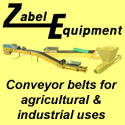 |
 |

|
|
|
North Dakota Ag News Headlines |
 |
Engineering Students Team Up with Industry
North Dakota Ag Connection - 04/03/2020
Imagine a bright orange sensor, about the size of a golf ball, that can travel through pipelines and detect potential leaks and other problems.
Those "smart" golf ball sensors, called Pipers and made by Ingu Solutions, are now a reality. They can be placed inside a pipeline and flow with the product stream.
Pipers, now being used in the oil fields, are just one solution to North Dakota Gov. Doug Burgum's 2017 challenge to the oil industry to find new ways to prevent pipeline leaks and protect the environment.
The University of North Dakota Energy & Environmental Research Center (EERC), is leading an industry consortium, called intelligent Pipeline Integrity Program (iPIPE), which is also working to develop new technologies to detect and prevent pipeline leaks.
The challenge is launching and receiving the Pipers without stopping product flow and executing the design without any cutting or welding in the field or during fabrication.
That's where UND mechanical engineering students come in.
Four seniors were tasked to design a prototype launcher to deploy and retrieve Pipers. The project is sponsored and supported by Hess Corp., which gave students a budget to order materials.
"Hess has a strong partnership with UND," said Reuben Gates, a Hess Corp. employee who is overseeing the project and is also a UND alum with bachelor's and master's degrees in mechanical engineering. "We've worked with them on the iPipe Consortium and with the UND Energy & Environmental Research Center. It made sense to keep it within UND's sphere."
It's a big project, with big benefits for North Dakota and the oil industry.
"This is an important project," said Gates. "It will minimize leaks, and it will make North Dakota a better place by minimizing leaks and protecting the environment. The challenge is the infrastructure."
Challenge, indeed.
The problem is that Pipers are so small -- between 1.5 and 2.2 inches -- that they're hard to "catch" inside the pipeline.
The students designed a solution -- much of which is proprietary -- which was recently approved by Gates. Now they are working to build it.
"The design is there," said Dominik Steinhauer, senior lecturer in mechanical engineering and instructor for the project. "I'm thoroughly impressed with this team."
"If you can't catch the Pipers, you can't read the data," said Zach Reinholdt, a mechanical engineering senior from Williston, who designed a solar-operated sensor that will send a signal when it's caught. "I really enjoyed figuring out a solution to the problem."
The key has been teamwork.
"This is a unique challenge from Hess and a good opportunity," said Noe' Lopez III, a distance mechanical engineering senior from Houston. "Everybody contributes. This team gelled very well, and there is no other feeling in the world than when you have a strong team."
Lopez added that technology have helped him and fellow distance mechanical engineering senior Karen Redig, from Glenrock Wyo., feel as though they're right on campus.
"It is a good experience," said Redig, who works full-time at a privately owned oil company. "The team meets a lot, and one hour meetings turn into two hours. I enjoy working with everyone and getting to know them."
Now that the design is approved, Riley Monson, a mechanical engineering senior from Bottineau, N.D., is looking forward to building the launcher and receiver prototype, which will be transported on a test stand he designed along with a pump and water tank.
"This has been a huge learning experience," Monson said. "We keep in touch with texts, Zoom meetings, and share ideas. I've enjoyed learning more about oil and gas."
"The students have not only gotten the opportunity to work through the design cycle of a product, but also to collaborate with working professionals on a project that can impact public safety and the environment," said Anjali Sandip, senior mechanical engineering lecturer and a faculty advisor for the project. "The skills acquired by the students would place them in a highly competitive position in the job market."
"This senior design project provides students with a very challenging real-world problem," said Cai Xia Yang, assistant professor of mechanical engineering and a faculty advisor. "They learned totally new technologies from Reuben Gates at Hess and Brad Stevens at EERC, and they came up with new ideas. I can't wait to see the prototype."
"Projects like this help students get a taste of the real world," said Steinhauer. "It's good, practical, hands-on experience that lets them apply all they've learned. Reuben and Hess have been amazing to work with."
"Although Karen and I are working at a distance, we feel right there," said Lopez. "Hess has given me an opportunity to better ourselves as project professionals. My favorite part of this project has been the team collaboration and innovating a new concept to help keep North Dakota's environment clean."
Even though all students are now meeting remotely because of the COVID-19 pandemic, the work continues.
"It's been fantastic working with the students," said Gates. "We're working on something that can make North Dakota even better."
Other North Dakota Headlines
|
|
 |


|
 |
|
Copyright © 2024 - Farms.com. All Rights Reserved. |
 |
|